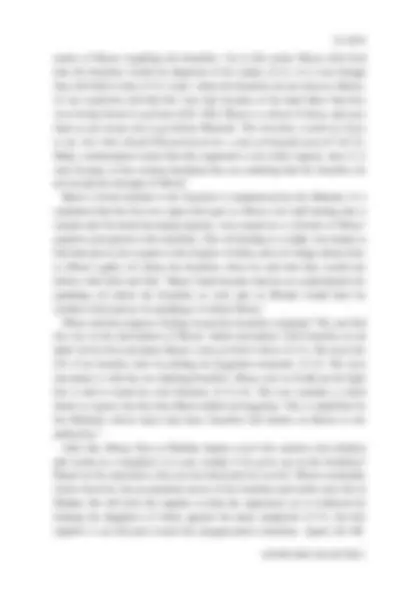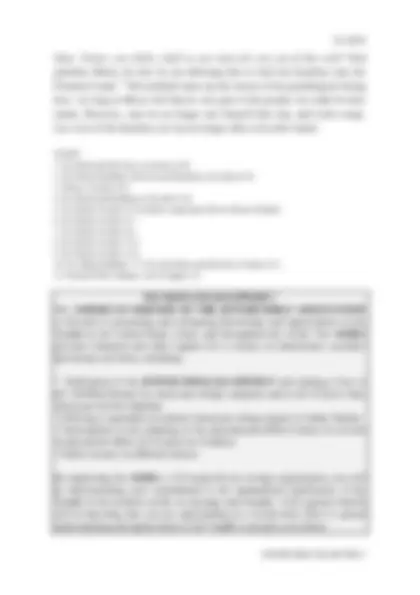





Study with the several resources on Docsity

Earn points by helping other students or get them with a premium plan


Prepare for your exams
Study with the several resources on Docsity

Earn points to download
Earn points by helping other students or get them with a premium plan
Community
Ask the community for help and clear up your study doubts
Discover the best universities in your country according to Docsity users
Free resources
Download our free guides on studying techniques, anxiety management strategies, and thesis advice from Docsity tutors
Exodus 6:14-26 contains a detailed account of the ancestry of Moses and Aaron. While Moses had been introduced in Exodus 2:1-10, the names of his parents and ...
Typology: Study Guides, Projects, Research
1 / 6

This page cannot be seen from the preview
Don't miss anything!




Zvi Ron was ordained by the Chief Rabbinate of Israel and is the rabbi of Keneseth Beth Israel in Richmond, Virginia.
Exodus 6:14-26 contains a detailed account of the ancestry of Moses and Aaron. While Moses had been introduced in Exodus 2:1-10, the names of his parents and siblings were not recorded there. We were merely informed that he was from the tribe of Levi. Only in Exodus 6:20 do we find out that his parents were named Amram and Jochebed. In addition, we are given much additional information about the lineage and family of Moses, including how long Levi, Kohath and Amram lived (6:16, 18, 20) and the name of Aaron's wife (6:23). Many elements of this genealogical listing are puzzling. Firstly, why is it found in this particular location? It interrupts the narrative of God sending Moses to speak to Pharaoh, necessitating a brief recap before we can return to the story. 1 Additionally, by this point in the narrative we are already familiar with Moses and Aaron. The ideal place for this section would seem to be at the very beginning of the Moses narrative in Exodus 2. Why is this informa- tion given here? The second major difficulty with this section is that before getting to the genealogy of Moses and Aaron, two verses are spent listing the sons of Reu- ben and Simeon (6:14, 15). It is clear that the main intent of the passage as a whole is to tell the background of Moses and Aaron, since their genealogy is very detailed and includes information on wives and longevity. Reuben and Simeon get one verse each, simply repeating information that is already known from Genesis 46:9-10. Why is this information about Reuben and Simeon given again here? The medieval rabbinic commentaries focus on the second issue, the inclu- sion of Reuben and Simeon. The standard simple approach [ pshat ] is that Reuben and Simeon were not listed for any particular intrinsic reason, but simply in order to reach Levi in the chronological order of the sons of Jacob. For this reason, the information about them is sparse. The goal of the passage is to get to Levi, and to do so one must go through the older brothers Reuben and Simeon. 2
Vol. 31, No. 3, 2003
A different approach is taken by Sforno, who explains that the list here is of all the heads of the families of the Israelites, which he understands as the leaders of the entire Israelite people. The leaders were all from the tribe of Reuben, Simeon or Levi. According to Seder Olam , Chapter 3, Levi outlived all of his brothers. Since Reuben and Simeon died before Levi, they were only able to instruct their sons in the ways of leadership, while Levi, who lived longer, was able to instruct his grandchildren as well. 3 The advantage of the interpretation of Sforno is that we have a reason for listing the sons of Reuben and Simeon here. The complication with this approach is that it pro- poses that the leadership of the Israelites came from only three of the tribes. While such a situation is possible, it is very unusual. We would have ex- pected every tribe to have its own leadership, and that if the leaders came from only some of the tribes, Judah should have been represented, as Judah is traditionally the foremost tribe. Aside from these pshat explanations of the inclusion of Reuben and Simeon here, there is a midrashic explanation as well. This explanation states that Reuben, Simeon and Levi appear here because they did not receive a blessing from their father Jacob. Their inclusion here demonstrates that they are an important part of the Israelite people despite the fact that their father did not bless them. 4 We are still left with the general question of why the genealogy appears here at all, and why it is placed as an interruption of the narrative flow. We can begin to understand the placement of this section when we compare the verses of the narrative which appear before and after it. In Exodus 6:12, we read: But Moses appealed to the Lord saying, 'The Israelites would not listen to me; how then should Pharaoh heed me, a man of impeded speech!' In verse 6:30, understood as a recap of 6:12, we read: Moses appealed to the Lord saying, 'See, I am of impeded speech; how then should Pharaoh heed me?' This restates the general intent of 6:12, but there is a significant change. Moses omits one of his reasons for not going before Pharaoh; namely, that if the Israelites did not listen to him, certainly Pharaoh will not. Moses leaves out a criticism of the Israelite people from his reasons. In fact, the transition from 6:12 to 6:30 marks the end of the critical com-
Vol. 31, No. 3, 2003
drash emphasizes this feeling, by noting that when the fighting Israelites threatened to turn him in, Moses decided that they deserved their fate and did not merit redemption.^9 At what point does Moses change his attitude and decide that the Israelites are indeed worth saving? There is no clear indication in the text when this takes place, but we have already noted the difference between his protests to God in 6:12 and 6:30. After the genealogical listing, Moses does not com- plain about the Israelites; not even when they verbally attack him by saying: 'Was it for want of graves in Egypt that you brought us to die in the wilder- ness? What have you done to us, taking us out of Egypt?' (14:11). When does Moses change from skeptical outsider to willing leader? It is during the ge- nealogical listing. The genealogy of Moses comes in 6:14 to show that it is precisely at that point that Moses begins to consider himself a part of the Israelites. He is no longer rejecting his brethren and speaking negatively about them. He is now fully prepared to lead them out of slavery. Furthermore, by beginning the genealogy with Reuben and Simeon, the Torah demonstrates that now Moses is prepared to consider himself more than just a part of the Israelite commu- nity. He also recognizes that this community includes people like Reuben, Simeon and Levi, who did unsavory things and were not blessed by their fa- ther. Moses accepts this and still views himself as part of the community. Again, this theme is emphasized by the Midrash. Just before the genealogy comes the verse (6:13): So the Lord spoke to both Moses and Aaron in regard to the Israelites.... The midrashic comment is that God commands that they must lead the Israelites even though the people may be unruly, difficult and contentious. Indeed, according to the Midrash, God commands Moses to lead the people even if they curse and stone him. 10 Moses heeds this command and is transformed in the way he looks at the Israelites, and at himself in relation to them. This transformation is indicated by the genealogy of Moses in verses 6:14-26. It is especially significant to note the interpretation given in Pesikta D'Rav Kahana on So the Lord spoke to both Moses and Aaron in regard to the Israelites.... There it is stated that God commands Moses never to call the children of Israel "rebels." Moses does so, once, in Numbers 20:10: Moses and Aaron assembled the congregation in front of the rock; and he said to
ZVI RON
JEWISH BIBLE QUARTERLY
them, 'Listen, you rebels, shall we get water for you out of this rock ?' God punishes Moses for this by not allowing him to lead the Israelites into the Promised Land.^11 This midrash sums up the lesson of the genealogical listing here. As long as Moses felt that he was part of the people, he could be their leader. However, once he no longer saw himself that way, and took a nega- tive view of the Israelites, he was no longer able to be their leader.
NOTES
WE NEED YOUR SUPPORT! The AMERICAN FRIENDS OF THE JEWISH BIBLE ASSOCIATION is devoted to promoting and advancing knowledge and appreciation of the Tanakh in the United States, Israel, and throughout the world. The AFJBA provides financial and other support for a variety of educational, scientific and literary activities, including:
By supporting the AFJBA , a US nonprofit tax-exempt organization, you will be demonstrating your commitment to the unparalleled significance of the Tanakh in the modern world, its message and insights. Your greatest benefit will be knowing that you are participating in a world-wide effort to spread understanding and appreciation of the Tanakh to people everywhere.